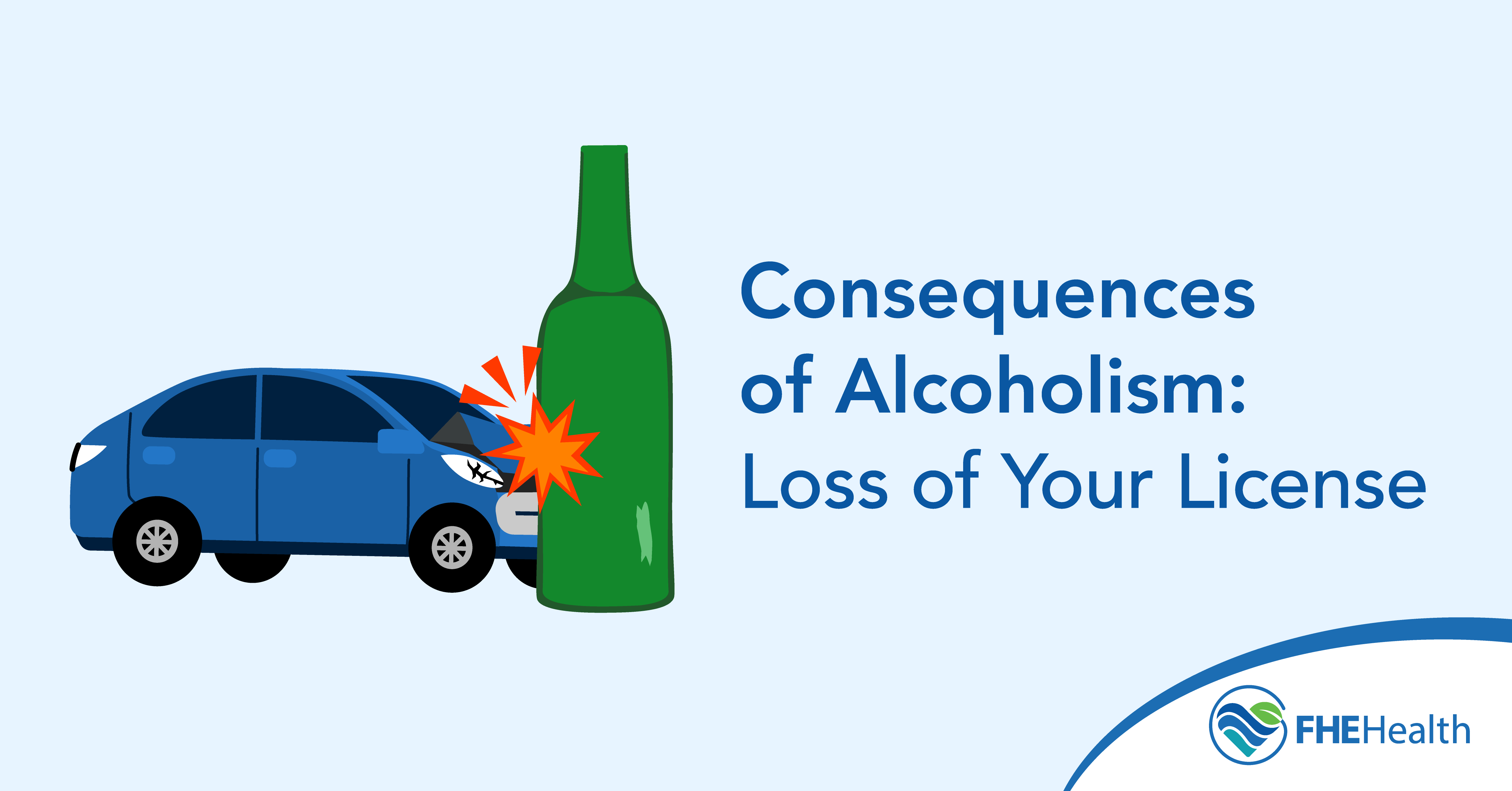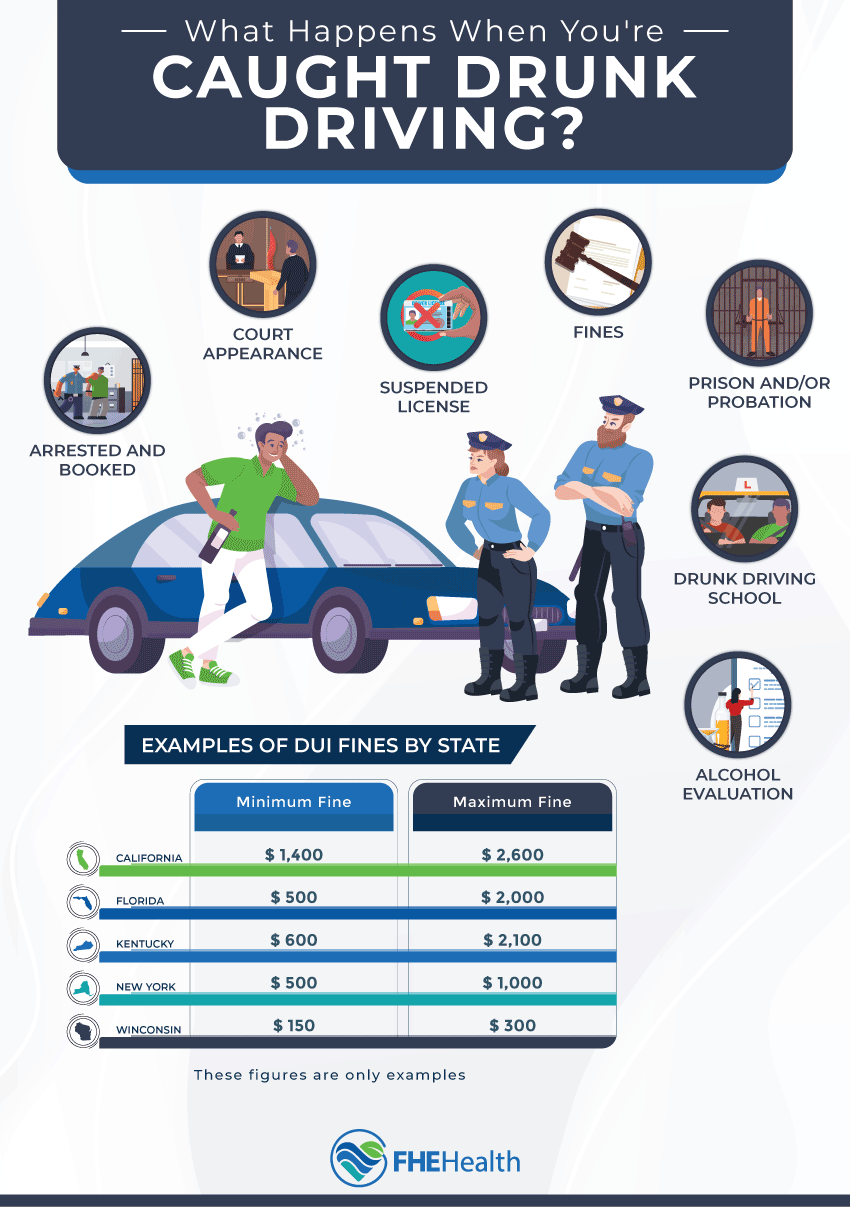
Despite alcohol being legal and the fact that most people consume it from time to time, consuming too much can have major consequences. Alcohol use disorder (AUD), more colloquially called “alcoholism,” is defined by the National Institute on Alcohol Abuse and Alcoholism (NIAAA) as an impaired ability to control alcohol use, even when it has adverse effects on one’s life such as legal consequences.
When people drink alcohol and drive impaired, this can result in the temporary or permanent loss of their driver’s license. Losing a driver’s license can impact virtually every aspect of someone’s life. From an inability to move freely from place to place to the adverse impact on an individual’s social and professional life, a DUI can be devastating and make it difficult to move forward in life.
DUI Laws and Alcohol-Related Violations
Every state has driving while under the influence (DUI) or driving while intoxicated/impaired (DWI) laws. The federal blood-alcohol concentration (BAC) limit is 0.08 percent, meaning that once you reach this percentage of alcohol in your blood by volume, you are considered legally impaired. Keep in mind that this is still below the threshold for what is considered drunk.
Some people view it as safe to drive if they have no more than one standard alcoholic drink per hour. This is a guideline, however, rather than a hard tool. The effects of alcohol can vary greatly based on individual factors, including:
- Size, biological sex, and body composition
- Any other drug or medication usage
- Unique genetics and how individual bodies processes alcohol
- How much food has been consumed
- How hydrated the individual is
- How quickly the alcohol is consumed
- Alcohol tolerance
While unlikely to fail a breathalyzer after one drink within an hour, it is possible, especially for physically small people with little-to-no alcohol tolerance. Additionally, someone who drinks regularly and has built up a high tolerance might not feel impaired but still test as over the legal limit. When in doubt, sit it out. Wait for an hour or two before driving and to ensure physical and legal safety.
Penalties for a DUI/DWI vary based on jurisdiction, but they commonly include:
- Fines
- Mandatory jail or prison time, depending on how many prior DUIs the individual has and/or if a severe accident occurs
- Suspension or revocation of driver’s license
- Court-mandated treatment or prevention programs
- Installation of an ingnition interlock to prevent future drunk driving
- Probation
Typically, a first-time DUI/DWI is treated as a misdemeanor, especially if no one was hurt. However, it may be aggravated to a felony level for particularly high BAC or if an accident caused by alcohol usage led to serious or fatal injuries.
Remember, these are general guidelines on alcohol use and DUI laws for the United States. Be aware of your state and municipality’s DUI/DWI laws to fully understand the legal ramifications of getting behind the wheel intoxicated.
Also, be wary of thinking you can avoid a DUI by refusing a BAC test. Some states will automatically suspend an individual’s driver’s license if the individual refuses to take the BAC test.
The Personal and Professional Impact of Losing a License
A driver’s license suspension due to drunk driving can have serious impacts that can last for years. Not only is it inconvenient, but a lack of a driver’s license can seriously impact several areas of life, including:
- Employment: Many jobs, even those that don’t require driving while on the clock, require employees to have and maintain a standard driver’s license. Even if someone’s job doesn’t, they may find it much harder to maintain their current employment due to how much more difficult it can become to get to and from work. Someone suddenly reliant on public transportation to get to their job might find themselves tardy frequently or discover that their 20-minute commute has now stretched to an hour or more due to needing to catch several busses. Those in rural areas may find themselves with no way to work at all.
- Future Employment: Finding a job with a criminal record can be much harder. A DUI/DWI conviction remains on the individual’s record and will show up on background checks. Many fields consider a DUI/DWI as a disqualifier, including law enforcement, education, jobs requiring commercial driver’s licenses, and other positions where sensitive information is handled.
- Access to Basic Needs: Everyday errands also become significantly harder to coordinate without the ability to drive. Individuals may have to pay extra to have groceries delivered or to cover the cost of a taxi. Being dependent on someone else in the home to drive can also put a significant strain on relationships due to a loss of independence.
- Financial Impact: Beyond paying for public transportation or extra services to accommodate an inability to drive, a DUI conviction resulting in license suspension can have far-reaching financial impacts. Even after the suspension ends, the individual will likely have to pay much higher insurance premiums. Once that DUI is on someone’s driving record, they’re considered a high-risk driver.
- Social Impact: Losing a driver’s license means losing the ability to drive to visit friends or family members. This can have a major impact on relationships, especially if the other parties feel like they have to put in all the effort for transportation due to the other person’s legal limitations.
Steps to Regain Driving Privileges
The exact process to reinstating a driver’s license depends on state regulations. However, they typically follow the same steps. In most cases, someone convicted of a DUI/DWI must complete the following before their license is reinstated:
- Complete Any Court-Ordered Treatment Programs: If you’ve been ordered to attend a rehab or treatment program, it must be completed prior to reinstatement.
- Pay for Reinstatement and Court Fees: Most courts charge a fee to reinstate a driver’s license that must be paid first.
- File an SR-22 or Other Proof of Financial Responsibility: This document informs the court that you have the minimum required auto insurance coverage. Many states require it after receiving a DUI/DWI. An insurance provider can produce this form.
- Install an Ignition Interlock: Ignition interlock devices are breathalyzers installed into a personal vehicle. They make it so a vehicle will not start unless the driver’s BAC is within legal limits. The driver may have to provide breath samples while driving as well.
- Attend a Hearing: After submitting all of the necessary documentation and waiting the allotted suspension time, the individual usually has to attend a hearing to prove they’ve complied with all sentencing stipulations and meet the requirements.
Some states may have additional or fewer steps to reinstate a driver’s license. Speaking to an attorney can help provide clarity about the process.
Preventing Recurrence Through Sobriety Support
While being convicted of a DUI/DWI is a serious offense, it’s also possible to move forward and learn from the consequences to avoid repeating them in the future. Often, maintaining sobriety is key to this process, with the help of supports such as:
- Mutual Support Groups: These are designed to connect people with AUD with others in recovery. Alcoholics Anonymous is a commonly known mutual support group.
- Personal Support Networks: Friends and family can be great personal supports while working on maintaining sobriety. Try making some sober friends to bring as plus-ones for social events.
- Professional Counseling: Everyone can benefit from individual counseling, and it can be especially useful in maintaining sobriety moving forward. Through counseling, individuals can learn better coping skills to help prevent future relapses.
- Rehab: Rehabs often have long-term programs including aftercare designed to help maintain sobriety after completing the main course of treatment.
If you’re struggling with alcohol use and it’s negatively impacting your life, reach out to us. At FHE Health, we provide evidence-based, individualized clinical treatments that support long-term sobriety, and we are here to help each step of the way.







